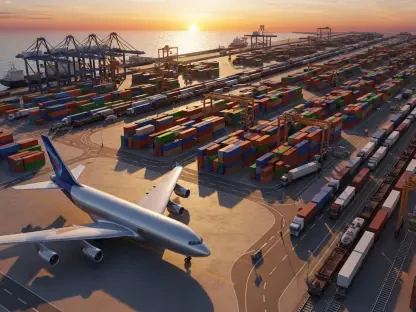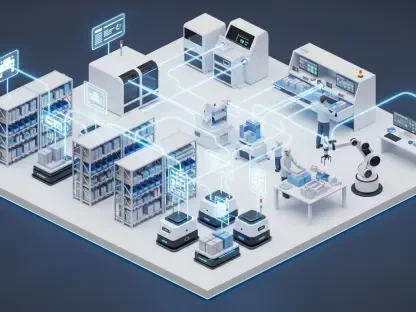The blockchain supply chain sector is rapidly transforming how goods are tracked and traded globally. As a cutting-edge use of blockchain, the technology offers increased traceability and streamlines logistics. The significant growth of this market is evident as it’s projected to expand from a valuation of $0.7 billion in 2022 to an impressive $14.06 billion by 2032. This surge reflects the industry’s growing trust in blockchain’s decentralized record-keeping to elevate the efficiency and integrity of supply chains. Companies are actively investing in these digital ledgers to safeguard product origins, optimize workflows, and fortify their supply networks against fraud. The statistics underscore a strategic pivot towards blockchain as a pivotal tool in modern commerce, ensuring more reliable and transparent supply chain management.
Driving Forces Behind the Blockchain Explosion
Demand for Transparency and Traceability
Blockchain technology is revolutionizing supply chains by providing an immutable record that traces the journey of products. As consumers become more ethically conscious, they demand transparency in the origins and history of their purchases. Blockchain meets this need by allowing both consumers and companies to verify the authenticity and ethical sourcing of products effortlessly.This innovation is crucial in combating fraud, streamlining recall processes, and ensuring adherence to regulations. It’s particularly impactful in industries like food and beverage, pharmaceuticals, and electronics, which are sensitive to the source and handling of products. The capacity of blockchain to foster trust by illuminating every step of a product’s path from origin to consumer is driving its adoption in supply chain management and fueling market growth. As blockchain technology matures, it promises more robust traceability and accountability throughout product lifecycles, benefiting businesses and consumers alike.
Technological Integration and Industry 4.0
The integration of blockchain with cutting-edge technologies like the Internet of Things (IoT), Artificial Intelligence (AI), and advanced data analytics marks a revolution in proactive supply chain management. Blockchain, when linked with IoT sensors, offers stakeholders immediate tracking of goods, elevating logistical precision to new heights. Simultaneously, AI-powered analytics harness this data, enabling improved demand forecasting and better inventory management. This technological synergy is propelling the supply chain industry from an outdated, reactive stance to a future-oriented, automated strategy. The enhanced efficiency and forecasting accuracy brought about by these integrations are pushing the boundaries of what’s possible in supply chain logistics, making it not just faster, but also smart enough to predict and adapt to the changing market demands seamlessly.
Market Evolution and Strategic Decisions
Overcoming the Challenges
The blockchain supply chain sector, while ripe with potential, is grappling with significant challenges. Integrating cutting-edge blockchain tech with existing systems poses considerable technical hurdles. Additionally, enhancing scalability and performance remains a pressing issue. Security vulnerabilities are a critical concern too, as cyber threats increasingly target digital infrastructures. Another major roadblock is the lack of adequately trained professionals who can proficiently manage the complexities of blockchain deployment. To surmount these obstacles, the industry must prioritize strategic investments in workforce training and commit to research and development. This will lead to the creation of more advanced, intuitive, and secure blockchain solutions, ensuring a smoother transition for legacy systems and bolstering the overall resilience of the digital supply chain against cyber risks.
Future Outlook and Regional Dynamics
The blockchain supply chain sector is developing differently around the globe. In Asia-Pacific, spurred by the production giants of China and India, there is a surge expected due to their strong export focus. North America and Europe are not far behind, committing resources to blockchain studies and trial initiatives across various sectors. The industry’s progression hinges on the balance of regulatory measures, regional economic strategies, and the capacity of companies to satisfy the distinct needs of each area. For enterprises aiming to tap into the full potential of blockchain for supply chains, staying attuned to the evolving market conditions by region is crucial. This understanding will help navigate the complex landscape and integrate blockchain effectively into supply chain practices.









